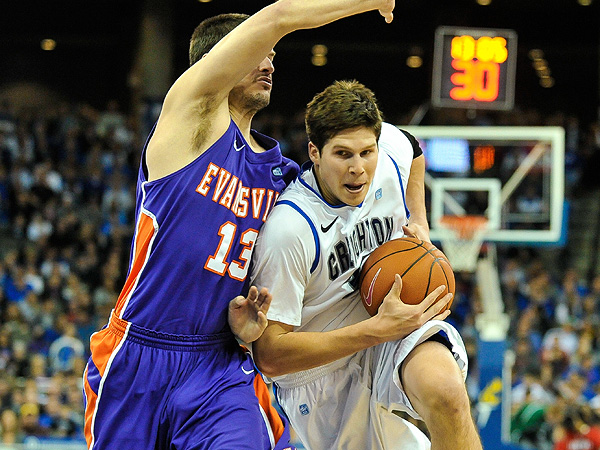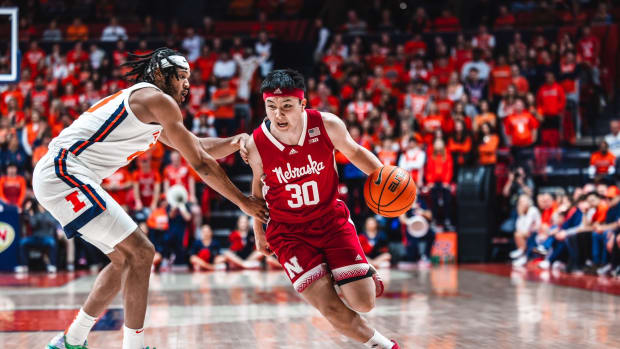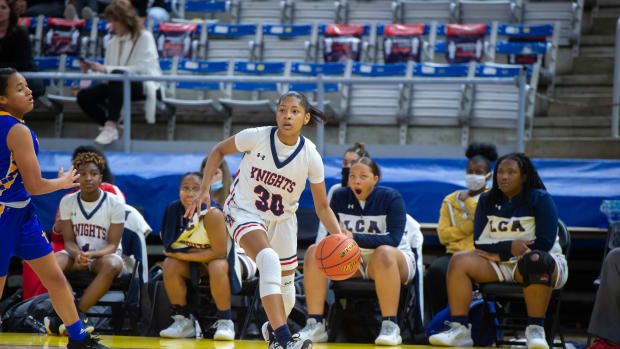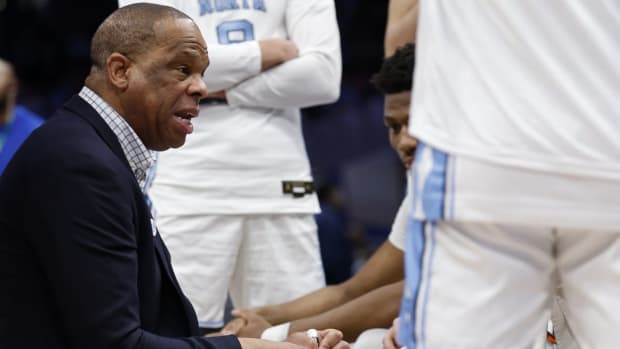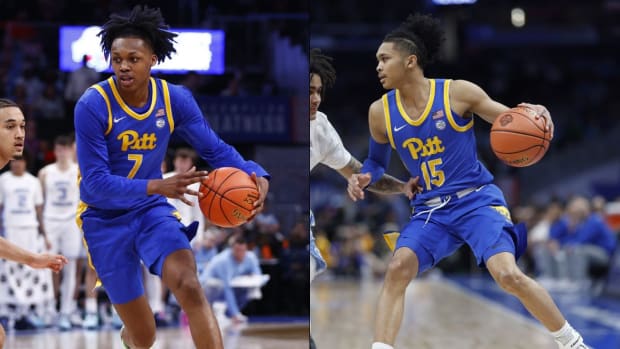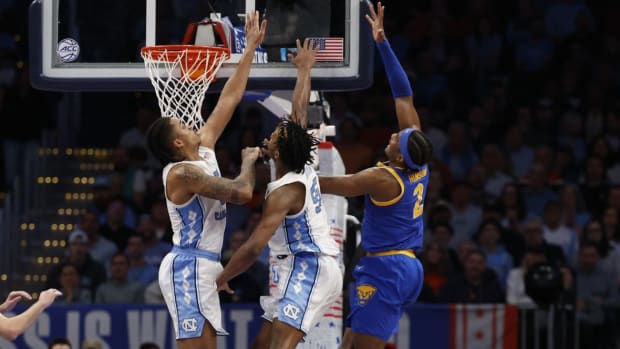Ranking college basketball's current top 20 programs: The honorable mentions
Doug McDermott's Creighton Bluejays have been one of the biggest benefactors of conference realignment. (Mitchell Layton/Getty Images)
History is a strong component of college basketball program status, but reputation doesn't always foot with current status, especially after the significant conference realignment of the past few years. As we move closer to what should be an outstanding 2013-14 season, it seemed a good time to really reevaluate the current national pecking order. Rep still matters, but as the game has become truly national, it's certainly not the only thing anymore.
There are a lot of different things that go into making a modern-day program into one of the best in the nation. Do you have a history of success? How is the program doing currently? Is it the product of one good coach or a sustainable level that can weather a coaching change? What is the basketball budget? How are your facilities? What league are you in and, perhaps as important, what is your place within that league? Do you have a good fan base? Are they fair-weather? How's your recruiting pipeline, and is that coach- or-location-related?
How you choose to prioritize those things will lead to significant debate over the overall ranking of programs as they sit today. This week, we'll break down the top 20, with five a day coming Tuesday-Friday. Today, we start off with the programs that just missed the cut (presented in alphabetical order).
Arkansas
A program that surprisingly has lost its way given its overall investment, its location relative to recruiting markets and being one of the few SEC programs that actually cares about basketball success. After the Razorbacks' run in the 1990s that included a national championship and another title-game appearance, having won just one NCAA tournament game since 1999 is a stunning decline. The Hogs haven't even won 20 games since 2008. Can Mike Anderson get this thing going again?
Baylor
Sort of the opposite of Oklahoma State in the Big 12. Almost zero legacy of historic success, but spending big and now winning big under Scott Drew. Two Elite Eights in the past four seasons and an influx of talent that's established the Bears are a very legit threat in the league. Can a nouveau riche program sustain if Drew leaves? If Texas changes coaches, what will the impact be on the Bears?
BYU
A good basketball history and a good coach in place currently, the Cougars continue to draw major numbers to the Marriott Center despite their move to the lower-rent West Coast Conference. They finished 2012-13 as the 13th best attendance team in Division I. The Cougars are basketball spenders on the magnitude of Gonzaga and should emerge over time as the regular challenger to the Zags in the WCC. They also have BYUtv as a significant distribution channel in addition to the TV coverage the league gets on ESPN and other networks.
Creighton
The Bluejays are one of the biggest benefactors of conference realignment, parlaying their massive crowds, sleek pro-style arena and legacy of solid basketball into an invite into the new Big East. They'll have to show they can compete at that level over time, not just in Year 1 when Doug McDermott and Co. should be one of the league favorites. The Bluejays finished sixth in the nation in average attendance last season (higher than Kansas, among others) and have their decent-sized urban market all to themselves. It will be interesting to see where this program goes over the next decade.
Marquette
A tough omission from the top 20 given the program's history, strong current run of performance, excellent coach, strong attendance and no football to water down the commitment to hoops. The move from the Big East to, well, the Big East is an interesting flex point for the program, as is whether they can keep Buzz Williams long-term. The new Big East basketball schools will be cutting larger checks, but the league's not as good or noteworthy as the old version and it's yet to be seen whether being on Fox rather than ESPN will have a negative impact (as being on other channels did for the Mountain West and others in the past decade). If Williams gets poached, can they find another coach of that caliber to keep things rolling?
Maryland
Probably the toughest omission from the top-20 list. I debated the Terps against options like Illinois and Gonzaga over and over again. When Mark Turgeon was hired, I argued fairly vehemently that Maryland could be a top-10 job in America. That was when the program was entrenched as the third-best in the ACC and the athletic department wasn't (at least publicly) bleeding cash. Now, after one more season, the Terps will move to the Big Ten, where the revenues are top shelf (plus UnderArmour's influence), but it won't be easy to establish a major foothold. Six of the top 20 current jobs are already in that league. The DMV provides a major local recruiting market and Turgeon has the staff in place to reel in big national prospects, too. Excellent fan base that cares. Historic success and a national title in the not-so-distant past. I remain bullish and the trend is up, but maybe not quite as much upside as before conference realignment.
New Mexico
An excellent legacy of hoops interest and currently rolling as the Mountain West's top program, there's a lot to like about the Lobos. Location is a minus in terms of national influence, but the historic Pit and the passionate fan base turns Albuquerque into a positive in many ways, too. Performance history is a bit overstated, as the Lobos have never made the Sweet 16 despite having a track record of successful teams and coaches. Not a national recruiting power by any stretch and now breaking in a first-time head coach to see if he can keep the momentum going.
NC State
A terrific basketball history and culture at the school, the Wolfpack have found themselves overshadowed by Duke and North Carolina too much in the past couple of decades. Mark Gottfried got the program some major preseason attention last year, but the Pack couldn't deliver on their promise. Relatively speaking, the Pack have one of the smaller basketball budgets in the new ACC. Only Clemson, Wake Forest and Notre Dame spent less money in 2012. Really passionate and perhaps unrealistic fan base is a plus and a minus.
Oklahoma State
Obvious levels of past success, one of the more famous arenas in the land, and (at least presently) a team that should make some national noise. Can Travis Ford keep the momentum going after Marcus Smart leaves? Are the Cowboys just taking relative advantage of a down period in the league, especially with Texas struggling? They're one of the largest-spending programs in the country, but have only won one NCAA tournament game since 2005. One of the "probably should be better" programs in the nation that was trending down until last season's bounce.
Oregon
The Ducks have the right coach in place and the results of Good Hire + Nike Money and Branding are starting to show. A new modern arena with a distinctive court design that some hate, but has spawned a bazillion knockoffs now as teams try to brand through their floors. Not a ton of historic success, although the Ducks made the Elite Eight in 2002 and 2007, and just made the Sweet 16 last season after being egregiously underseeded. The budget could be bigger, and football is obviously ruling the roost at the moment.
Pittsburgh
Note: I omitted the Panthers from the initial post, but on second look, they should have been in this group.
The Panthers have been a touch down the last couple of seasons, but five Sweet 16s since 2002 have stamped the program with ample legitimacy. Getting Jamie Dixon to stay this past offseason was a plus. Despite some detractors that bemoan a relative lack of NCAA tournament success (two total wins from 2010-13), he's done a very strong job overall. Will the move to the ACC be a good thing, though? The league is going to be brutal and Pitt is a bit of a geographic outlier, which could make recruiting an interesting challenge in a league where talent will certainly be needed.
Tennessee
The Volunteers are one of the top attendance teams in the nation (eighth in per-game draw in 2013), even though cavernous Thompson-Boling Arena means seats are available. Cuonzo Martin has the program trending in the right direction and should have the Vols back in the NCAA tournament this season. There isn't a tremendous legacy of success in the program's past, but Bruce Pearl showed what is possible with the right coach in place. The 2012 men's basketball budget was only ninth-best in the SEC, and when Kentucky and Florida are rolling, it's tough to break into the top two in this league.
UNLV
The Rebels have lots of glitz, but also some substance to go with their history and packaging. The Tarkanian years obviously put the program on the national map, but the recent run, first under Lon Kruger and now sustained by Dave Rice, is making the Rebels relevant again nationally. They just had the No. 1 overall pick in the NBA draft and own Sin City from a sports fan's perspective. The Thomas & Mack Center is wearing its years well as a vestige of the 1980s and can be a fun place to watch a game. The Rebels need to take the next step in performance quality to move up on this list.
Washington
A program that has a lot going for it, and for years was one of the bellcows on the West Coast. Performance has been a bit down lately, with some question about how much longer Lorenzo Romar will remain there if it doesn't get back to expected standards. Romar's been solid overall, but it feels like the Huskies have left something on the table during his tenure, as well. Hec Edmundson Pavilion is the answer to "What current arena has seen the most home team wins?" but it's also small and the Huskies aren't even selling it out regularly these days. Seattle is a nice recruiting market, the campus sits right on the water, the budget is there to be an annual player in the Pac-12.
